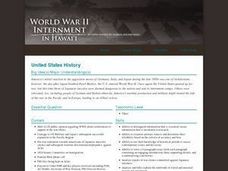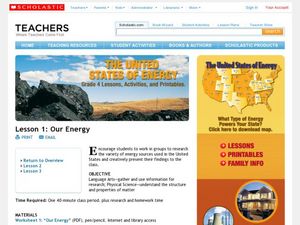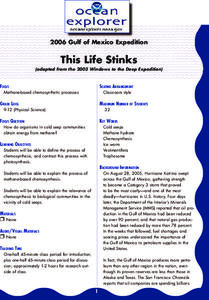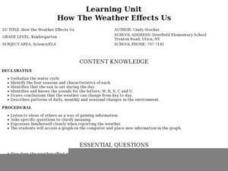Curated OER
Volcanic Activity in the U.S.
Students locate and map ten volcanoes in United States, create chart comparing volcanoes by last eruption, type of volcano, location, and interesting fact, and create Powerpoint slide show describing basic
information about volcanoes and...
Curated OER
World War II: Internment in Hawaii
Students examine world history by writing an essay in class. In this World War II lesson, students identify the attack on Pearl Harbor, the response from the U.S and the effect it had on Japanese-Americans. Students define Japanese...
Curated OER
Expanding the Mission: Historical Parks
Students explore U.S. geography by viewing a documentary in class. In this national parks lesson, students view video clips of individual national parks and locate them using Google Earth software. Students create a persuasive...
US Department of Energy
Thermodynamics—Teacher Guide
I'm so cool! No, you're exothermic. This thermodynamics lab unit includes an introduction, teacher demonstrations, six labs that students rotate through each class day, homework assignments, application of knowledge, and...
Curated OER
It's a Gas! Or is it?
Examine the effects of temperature and pressure on solubility and the states of matter of ocean water. Learners make inferences about the unique chemistry of ocean water at different depths. They engage in an activity related to...
Curated OER
Trout across America
Students research trout and salmon and create a report. In this trout and salmon lesson plan, students research where trout live in the United States, fill out a graphic organizer, and create a report on their findings.
Curated OER
Our Energy
Fifth graders research energy sources used in the United States. In this energy sources lesson, 5th graders work in teams to research various energy sources. Students complete a worksheet for the research and make a short video of a...
Curated OER
Hazard Alert
Students examine data regarding the occurrence of natural hazards as they occur in the United States. They record data on a classroom chart, map the areas affected by the hazards, and analyze and discuss conclusions drawn from the...
Curated OER
Weather Watchers
Students conduct Internet research of their community's weather and compare it to the weather in another location. After conducting research, students become weather reporters by reporting their findings to the class by using a...
Curated OER
CSI on the Deep Reef
After some instruction, small groups prepare a written report on chemotrophic organisms. Though not clearly mentioned, this resource would work best if groups have the Internet available to research the vocabulary and different organisms...
Curated OER
This Life Stinks
Chemosynthetic communities of cold seep areas are considered in this lesson. Working in collaborative groups, marine biology or oceanography learners research and prepare a report about oxidation-reduction reactions involved with...
Curated OER
It's a Gas! Or is it?
Oceanography enthusiasts are given a series of thought experiments to consider in order to relate the solubility of gases and solids to underwater volcanoes. It is not particularly engaging to perform these thought experiments. Choose...
Curated OER
Identifying Risks at a Superfund Site
Young scholars work together to discover the type of risks at Superfund sites. They examine how sites are found and where to report hazardous sites. They evaluate the activities of the government to protect its citizens.
Curated OER
So You Think the World Evolves Around You?
Students examine the topic of evolution as it relates to biodiversity in various remote areas of the world. They watch videos, conduct Internet research, and in small groups create a digital video report to illustrate common evolution in...
Curated OER
Global Warming and Climate Change
Students explore the environment by writing a persuasive letter. In this global warming lesson plan, students identify the key problems with our energy consumption in the United States. Students complete worksheets and write a letter...
International Technology Education Association
Become a Weather Wizard
Accurate weather forecasting is something we take for granted today, making it easy to forget how complex it can be to predict the weather. Learn more about the terms and symbols used to forecast the weather with an earth science lesson...
A to Z Teacher Stuff
Word Search Match
Go beyond a traditional word search with a clue matching, word search combo. Scholars read clues, write the word that matches, then search for the word in a puzzle. Clues and words offer insight into the life of polar bears.
Curated OER
NTeQ Science Lesson
Students produce a report on the types of dinosaurs found in our state of Texas using a word processing software.
Curated OER
This Life Stinks
Students study how organisms that live in cold seep communities get energy from methane. In this organism lesson students write a brief report and identify oxidation reduction reactions and explain if these are dependent of...
Curated OER
Cool Corals
Students explore corals and polyps. For this coral reef lesson students divide into groups and prepare a written report.
Curated OER
Hands On Biodiversity: Networking Students and Their Biomes
Students telecommunicate and use the US Mail to network students from five biomes in the United States in order to monitor water quality in each area. They have e-mail pals and exchange materials representative of themselves and their...
Curated OER
Human Embryonic Stem Cells
Students use the Internet to discover information about human embryonic stem cells from the National Institutes of Health. They examine different sides of the debate to use or not to use stem cells. They can also listen to speeches given...
Curated OER
How The Weather Effects Us
Students discover how weather affects their lives. They review the climates of Florida, Alaska and New York. They need choose the place they would most like to live in based on the climate of that state.
Curated OER
Investigate Non-native Neighborhood Invasion Species
Learners investigate non-native species that are invading local or state environments. They choose one species to research and report on.























